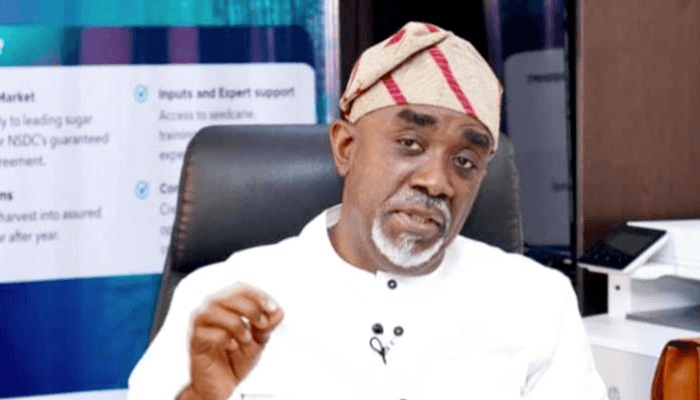Tareq Muhmood, Regional President for Central and Eastern Europe, the Middle East and Africa (CEMEA), was in Nigeria recently. In this interview, he spoke on a number of issues on digital payment, including security and competition. He said financial inclusion is at the core of Visa’s mission in Nigeria. “The Visa Foundation, through its Equitable Access Initiative, is investing $200 million to support gender-diverse and inclusive small and micro businesses globally, including businesses in Nigeria.” Daniel Obi brings the excerpts.
“Taken together, these initiatives reflect our vision to enable access and meaningful participation in Nigeria’s digital economy for women, youth, farmers, and small businesses alike.”
Visa is often described as more than a payment network. How do you see Visa’s role in shaping commerce and financial access in Nigeria and across Africa?
At Visa, we see ourselves as much more than a payment processor. Our role is to be an enabler of commerce by building the infrastructure, partnerships, and trust that power the digital economy. In Nigeria, that means working with banks, fintechs, and regulators to expand access to secure digital payments, while also investing in the technology and capabilities that make those payments faster, safer, and more reliable.
Beyond access, our ambition is to support Nigeria’s position as a payment hub for West Africa, a place where businesses of every size, from small merchants to large corporates, can connect seamlessly to opportunities across the region and beyond. At the same time, we are creating value for different segments of society, from underserved communities who are coming online for the first time to affluent consumers who expect premium, globally connected experiences.
Our vision is to help shape Africa’s financial future by enabling secure, innovative, and inclusive solutions that make it easier for individuals and businesses to participate fully in the digital economy.
Affluent Millennials and Gen Z are increasingly lifestyle-driven. How is Visa tailoring its rewards and benefits to meet the expectations of this growing demography?
We recognise that Millennials and Gen Z are shaping the future of commerce, and their expectations go beyond payments; they are looking for experiences that align with their lifestyles, values, and ambitions. At Visa, we are tailoring our rewards and benefits to meet these needs by focusing on what matters to them: convenience, exclusivity, security and access.
That means creating programmes that connect them to lifestyle-driven experiences – from travel and dining to fashion, sports, and entertainment. For example, our premium cardholders enjoy exclusive access to world-class sporting events through Visa’s partnerships with FIFA, AFCON and the Olympic Games, as well as curated dining experiences and travel benefits that make their journeys seamless and rewarding. In Africa, we have extended this into culture and entertainment by supporting platforms like Afrobeats festivals and fashion showcases that resonate strongly with younger audiences.
We are also embedding digital-first solutions that allow them to engage with these benefits through the platforms they already use, making the experience intuitive and relevant. For this generation, trust and sustainability are equally important, so our innovation emphasises secure, transparent, and responsible payments. By blending premium value with meaningful experiences, we aim to ensure that Millennials and Gen Z see Visa not just as a payment method, but as a lifestyle partner that enhances the way they live, travel, and connect.
With growing competition in the payments industry, what sets Visa’s premium and lifestyle offerings apart?
What sets Visa apart is the combination of global scale and local relevance. Our premium and lifestyle offerings are designed to provide rewards and open doors to experiences that are difficult to replicate. Through Visa’s global partnerships, whether it’s with FIFA, AFCON, the Olympic Games, or leading travel and hospitality brands, our cardholders enjoy access to exclusive events, benefits, and services that extend beyond transactions.
At the same time, we are deeply committed to making these experiences resonate locally. In Nigeria and across Africa, that means tailoring offerings to reflect the passions of our consumers, from music and fashion to dining and travel. We have brought our global network to life by supporting regional cultural touchpoints and enabling seamless, secure payments wherever our cardholders go.
Another differentiator is the trust and security Visa brings. Consumers today want premium experiences, but they also want peace of mind. Visa’s advanced security infrastructure ensures that every transaction is protected, so our cardholders can focus on enjoying the lifestyle benefits without worry.
What makes Visa’s premium and lifestyle value unique is the blend of global access, local resonance, and uncompromising security, positioning Visa as not just a payments brand but as a trusted partner in the way people live, travel, and experience the world.
What new types of rewards or lifestyle experiences can affluent Visa cardholders in Nigeria look forward?
We see affluent consumers in Nigeria increasingly seeking experiences that go beyond traditional rewards. They want access, convenience, and a sense of exclusivity. That is why Visa is expanding into categories such as curated travel experiences, luxury retail, and premium dining. We are also investing in lifestyle benefits linked to wellness, digital services, and cultural experiences that reflect the passions of younger, globally connected Nigerians.
Looking ahead, our focus will be on creating seamless journeys where payments and experiences merge – whether that’s priority access at events, personalised travel services, or exclusive partnerships with local and international lifestyle brands. The aim is to ensure that every time a Visa cardholder uses their card, they feel the difference of being part of a global yet locally relevant network.
Read also: Visa, PEMANDU to transform digital services in 14 African countries
Financial inclusion remains a priority. How is Visa working with banks, fintechs, and telcos to expand digital access for women, youth, and small businesses?
Financial inclusion is at the core of Visa’s mission in Nigeria. We partner with banks to develop user-friendly, affordable products and solutions that bring the unbanked and underbanked into the financial system. Our partnerships with fintech innovators like Chipper Cash, Paga, Moniepoint, and others extend Visa into digital wallets, lending platforms, and everyday tools used by youth and SMBs. Our collaboration with our partners enables all users to access both virtual and physical Visa cards, unlocking global acceptance for consumers and informal merchants alike.
Beyond fintech, we leverage our network to target underserved populations through education and capacity-building efforts. The Visa Foundation, through its Equitable Access Initiative, is investing $200 million, broken down into $60 million in grants and $140 million in impact investments, to support gender-diverse and inclusive small and micro businesses globally, including businesses in Nigeria. By combining global financial infrastructure, local innovation, and strategic investment, Visa is creating new pathways for women, youth, and small enterprises across Nigeria to access, benefit from, and flourish in the digital economy.
Can you share tangible impact stories that highlight Visa’s contribution to driving financial inclusion in Nigeria?
At Visa, we believe inclusion must be measured in terms of real impact, and Nigeria offers several examples we are proud of. One such example is our partnership with Paga, which has helped expand access to digital payments for millions of Nigerians and extend operations to global markets. By leveraging Visa’s secure network, Paga users are now able to make seamless international transactions, linking more people and businesses to the global economy.
We have also taken bold steps to support scale.
Earlier this year, Visa invested in Moniepoint, one of Nigeria’s leading fintechs. That investment is about deepening SME access to digital banking and ensuring that small businesses can thrive in the digital economy.
Taken together, these initiatives reflect our vision to enable access and meaningful participation in Nigeria’s digital economy for women, youth, farmers, and small businesses alike.
One of our early collaborations was with Women’s World Banking, EFInA, and former Diamond Bank, where we helped design a savings solution for underserved women. By combining branch-based services with mobile access, the programme allowed women to move away from informal savings and into safer, more reliable financial products.
More recently, through the Visa Everywhere Initiative, we collaborated with Thrive Agric, a Nigerian AgriTech company, to expand access for smallholder farmers. Today, over 500,000 farmers across Nigeria, Ghana, and Kenya are benefiting from access to bank accounts and cards. This is a direct example of how fintech partnerships can lift entire communities into the financial mainstream.
Security and trust are critical for new entrants into digital payments. How is Visa addressing concerns around fraud, safety, and digital literacy in underserved markets?
Ensuring trust is foundational to a robust digital payment ecosystem, and this starts with delivering both technology and education.
On tokenisation, Visa’s impact has been clear and measurable. In 2023 alone, tokenised payments shielded businesses from about USD 650 million in fraud. Since its launch in 2014, more than 10 billion tokens have been issued, with adoption now reaching nearly a third of all transactions processed by Visa. The technology has helped cut fraud rates by up to 60 percent and boosted approval rates, making digital payments both safer and more reliable. This greater trust is encouraging more consumers and businesses to embrace digital commerce, strengthening financial inclusion in the process.
On the technology front, Visa leverages its global standards to safeguard every transaction. We deploy tokenisation to protect card data, AI-powered fraud monitoring to spot unusual activity in real time, and advanced risk scoring to prevent threats before they materialise.
We also recognise that building trust requires that people feel confident in using digital payments safely. That is why Visa partners with community organisations to deliver financial literacy and digital safety programmes, especially in underserved and rural areas. By combining secure infrastructure with grassroots education and support, we are making sure that digital payments are not just technically safe but also trusted and understood by those who need them most.
Finally, what is Visa’s long-term vision for Nigeria and Africa, particularly in balancing premium services for affluent clients with inclusive access for underserved communities?
Our long-term vision is to create an Africa where everyone, whether a professional, a smallholder farmer, or an entrepreneur, can fully participate in the digital economy. We are committed to delivering premium, lifestyle-focused services for affluent clients while simultaneously investing in infrastructure, partnerships, and education that expand access for underserved communities.
This balance is central to our strategy. On one hand, we provide affluent consumers with tailored rewards, experiences, and seamless digital payment solutions. On the other hand, we work with banks, fintechs, and NGOs to reach women, youth, SMBs, and rural populations, ensuring they have safe, reliable, and accessible ways to engage in commerce.
In Visa, we see ourselves as an enabler of opportunity, growth, and trust across Africa.
Through our focus on market-relevant innovation, we aim to build a financial ecosystem that benefits everyone and positions Africa as a leading hub for digital commerce globally.











